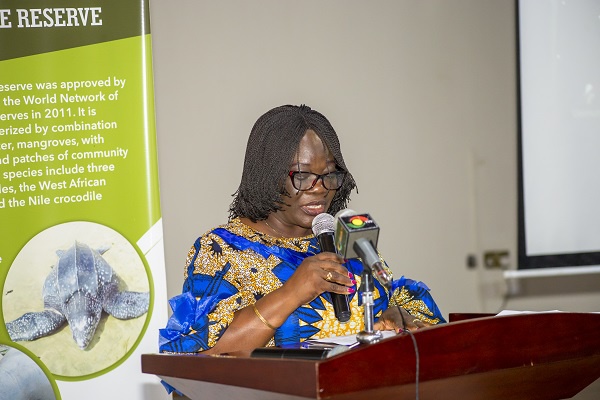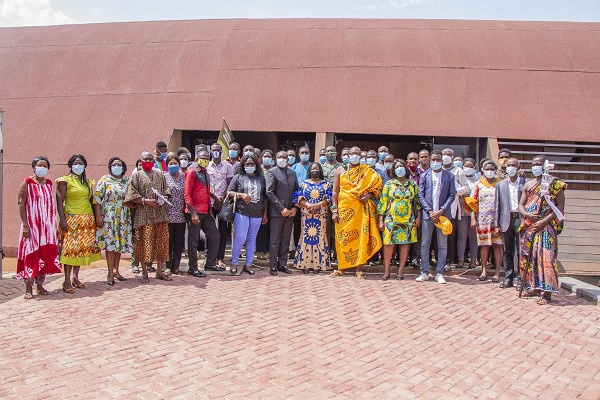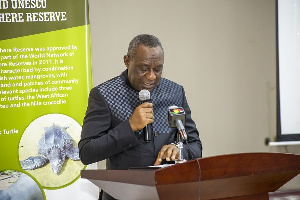- Home - News
- Polls
- Year In Review
- News Archive
- Crime & Punishment
- Politics
- Regional
- Editorial
- Health
- Ghanaians Abroad
- Tabloid
- Africa
- Religion
- Election 2020
- Coronavirus
- Photo Archives
- News Headlines
- Press Release
Press Releases of Thursday, 26 November 2020
Source: MESTI
Chief Director of MESTI launches Man and Biosphere (MAB) Youth Network in Ghana
A National Youth Network for the MAB Programme was inaugurated by Mrs. Cynthia Asare Bediako, Chief Director of MESTI on 19 November 2020 during the second National Forum on Biosphere Reserves held at Aquasafari Resort in the Songor Ramsar Site and UNESCO Biosphere Reserve in the Ada East District.
Delivering the keynote address on the theme ‘Ecosystem Services and Benefit Sharing in UNESCO Biosphere Reserves – Our Role as Stakeholders’, the Chief Director said that, humans are an integral part of the ecosystem and benefits that people obtain from ecosystems include provisioning services such as food and water; regulating services such as flood and disease control; cultural services such as spiritual, recreational, and cultural benefits; and supporting services such as nutrient cycling, that maintain the conditions for life on Earth.
She noted that biodiversity is the source of ecosystem goods, such as food and genetic resources, and changes in biodiversity can influence the supply of such ecosystem services.
The forum was graced by Nene Agudey Obikyire III the Mankralo of Ada Traditional Area on behalf of Nene Abram Kabu Akuaku III, paramount Chief of Ada and his elders in his speech, touched on humans being higher and therefore having greater responsibility to work and protect nature. He expressed the hope that the forum would help to protect and preserve the resources that nature has been bequeathed to us.
The Executive Director of the Environmental Protection Agency (EPA) who doubles as the Chairman of the Ghana MAB Committee, Dr. Henry Kwabena Kokofu said that, human interaction with nature is essential and it should be beneficial to both nature and humans, however, nature has always had to give way because of human needs.
The Executive Director said the MAB programme has used knowledge from diverse backgrounds to improve human livelihoods and efficiency in the management of natural resources across the world including Ghana. Thus, the MAB Programme over the years has employed the scientific approach to address issues of biodiversity loss, climate change and sustainable development.
Dr. Henry Kwabena Kokofu, said, over the years, the Agency had coordinated and funded activities in the 3 biosphere reserves in Ghana except for donor funded projects.
He explained further that the Agency is actively exploring other avenues to provide other forms of support for the three (3) reserves in Ghana and also add other potential sites as Biosphere Reserves.
Currently with the help of the National Commission for UNESCO, a Model Bead Production Centre was to be constructed at Ada to empower women to use waste glass to produce beads for local and international sale.
In addition, the EPA is working with the German counterparts in Schaalsee to build a tourist information center in Lake Bosomtwe, while in Bia, the MAB secretariat provided technical support to 220 beneficiaries of the Green Economies in Biosphere Reserves project.
The District Chief Executive for Ada East District, Hon. Sarah D. Pobee stated that the Songor Wetland was designated as Ramsar site in 1992 and was selected as part of the World Network of UNESCO Biosphere Reserves in 2011.
She said that the site had overcome some challenges threatening its existence but some habitats are critical for biodiversity and community livelihood. She continued to say that the site has undergone tremendous ecosystem transformation over the years due to excessive resource exploitation, climate change and natural phenomena.
Mr. Ebenezer Appah -Sampong, Deputy Executive Director, Environmental Protection Agency highlighted the achievements of Ghana to include serving on the International Coordinating Council of the MAB Programme (MAB Council) for 3 terms, chairing the African Network of Biosphere Reserves (AFRIMAB) for two consecutive terms (2013 –2017), and collaborated with UNESCO and the German National Commission to publish a manual for the management of African Biosphere Reserves to assist biosphere reserve stakeholders handle day-to-day management challenges.
Also, Ghana was represented on the International Advisory Committee for Biosphere Reserves for three terms (2011 – 2014 and 2015 – 2022) among many others.
A total of 120 participants drawn from the MAB National Committee, University of Ghana students, Ministries, Departments and Agencies, Civil Society, Traditional leaders and stakeholders from Ghana’s three (3) biosphere Reserves (Bia, Songor and Lake Bosomtwe) were present at the forum.
In addition, members of partner MAB Committees in Nigeria, Slovenia, Argentina, Austria, UNESCO Head Office in France, and other stakeholders from Ghana joined the forum via Zoom.
The forum is expected to foster stakeholder collaboration for sustainable development initiatives and ensure increased youth engagement in implementation of the MAB programme, especially to take part in the MAB Young Scientist Award Programme.






Entertainment










